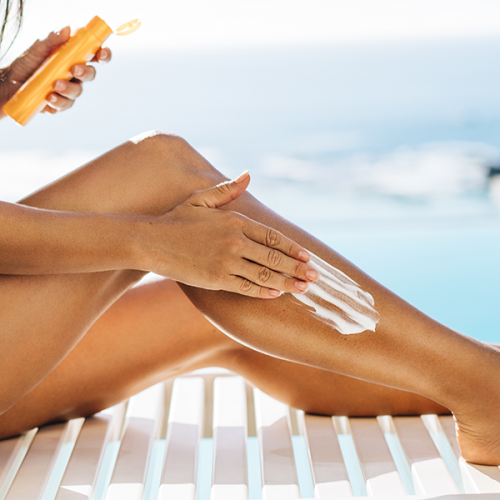From an early age, we have been taught to apply sunscreen when spending time outdoors, but does the sun protection factor (SPF) on the bottle actually make a difference? Focus asked about how to stay protected from the sun.
Wearing sunscreen helps protect your skin from ultraviolet (UV) rays, but did you know that the ingredients in the sunscreen are equally as important as the SPF on the bottle?
SPF, or sun protectant factor, is the measurement by which sunscreen will protect your skin from the sun’s harmful UVB rays, which are responsible for sunburns and linked to skin cancer. “SPF does not measure protection against UVA rays, which are responsible for skin aging,” Mass. Eye and Ear dermatology specialist Dr. Oon Tian Tan explained. “So when choosing a sunscreen, look for labels that clearly state the sunscreen is broad-spectrum and blocks both UVA and UVB rays.” It is an added bonus to find a sunscreen that is also water resistant, she said.

How to screen sunscreens
The ingredients in sunscreens can be another sign of their ability to provide protection. There are two types of sunscreen, physical and chemical. A physical sunscreen does not easily absorb on the skin and normally contains ingredients such as zinc and titanium. This kind of sunscreen will sit on the skin’s surface and reflect away the sun’s rays. It needs to be applied at least 15 minutes prior to sun exposure.
A chemical sunscreen is absorbed into the skin and contains ingredients like oxybenzone and avobenzone. Chemical sunscreens need to be applied at least 30 minutes before sun exposure to be fully absorbed.
When it comes to lotion versus spray sunscreens, Dr. Tan recommends the cream sunscreen. The speed of the spray application across the skin is a main factor in its effectiveness. Dr. Tan also mentioned that spray suntan lotions are being discouraged because particles are able to get into the lungs and cause irritation. “Regardless of the type of sunscreen you use, it should be reapplied every two hours especially when you are outside.”
Is it necessary to purchase sunscreen higher than SPF 50?
“There is a misconception that anything over SPF 50 works, and it’s just as important to reapply SPF 50 as it is SPF 15,” commented Dr. Tan. “Unless sunscreen states that it blocks UVA and UVB rays, it tends to only block UVB rays, which does not completely shield the skin from the sun.”
When choosing your next sunscreen, be sure to always read the label. Doing so will help you pick a product that provides the most protection so that you and your family stay safe (and have fun!) in the sun.
About Our Expert
 Dr. Oon Tian Tan is a dermatology specialist who uses lasers to treat skin diseases and disorders. She sees adult and pediatric patients at Mass. Eye and Ear, Main Campus.
Dr. Oon Tian Tan is a dermatology specialist who uses lasers to treat skin diseases and disorders. She sees adult and pediatric patients at Mass. Eye and Ear, Main Campus.